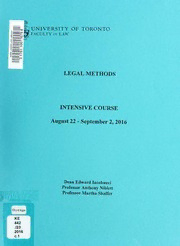
Legal methods PDF
Preview Legal methods
UNIVERSITY OF TORONTO FACULTY of LAW LEGAL METHODS INTENSIVE COURSE August 22 - September 2, 2016 Dean Edward Iacobucci Professor Anthony Niblett Professor Martha Shaffer Storage BORA LASK1N LAW LIBRARY AUG 1 6 2016 FACULTY OF LAW UNIVERSITY OF TORONTO LEGAL METHODS INTENSIVE COURSE August 22 - September 2, 2016 Dean Edward Iacobucci Professor Anthony Niblett Professor Martha Shaffer Legal Methods Intensive Course University of Toronto, Faculty of Law August 22 - September 1, 2016 Section A Section B Section C Edward Iacobucci Martha Shaffer Anthony Niblett [email protected] [email protected] [email protected] (416) 978-3718^ (416) 978-1752 (416) 978-5403 Office: Jackman J406 Office: Jackman J432 Office: Jackman J366 Evaluation: • This course is evaluated on a credit/no credit basis. • To receive credit for this course, students must attend class and complete: o One take-home briefing exercise, o One in-class legal analysis exercise. Course description One of the central goals of our JD program is to train students to “think like lawyers.” The Legal Methods intensive course is designed to introduce students to the foundational information and reasoning needed to make the most of the JD program from the outset. The course will provide general background information on the foundations of the Canadian legal system, such as the important legal institutions, the distinction between private and public law, the sources of law, and the relationship between core first year courses. The course will emphasize legal analytical methods and techniques used by law students. The course provides an introduction to analyzing and briefing cases, teaching students to identify key elements of a case and how to use precedents. The course also introduces students to statutory interpretation, the interaction between courts and the legislature, and an introduction on to how to prepare for and write law school exams. Schedule of classes Week 1 Monday, August 22 Introduction to Law School Tuesday, August 23 Aboriginal Law, Reading and Briefing Cases Wednesday, August 24 Precedents: How to Use and Work with Cases Thursday, August 25 Legal Arguments and Reasoning by Analogy Week 2 Monday, August 29 Statutory Interpretation Tuesday, August 30 Introduction to Constitutional Law Wednesday, August 31 Judicial Review of Constitutional Validity Thursday, September 1 Course Review, In-Class Writing Exercise Page 1 REQUIRED READINGS WEEK 1 Monday, August 22, 2016 Introduction to Law School Casebook Pages • What is Law? 5-10 • Morland-Jones v Taerk, 2014 ONSC 3961 11-15 • Mustapha v Culligan of Canada Ltd., [2008] 2 SCR 114 16-20 Tuesday, August 23, 2016 AM: Aboriginal Law No Readings PM: Reading and Briefing Cases Casebook Pages • Structure of the Courts, Legal Reasoning, Common Law 21-28 • Wicks Estate v Harnett, [2007] OJ No 2120 29-36 Wednesday, August 24, 2016 Precedent and Using Cases Casebook Pages • Menoxv v Jordan House Ltd., [1974] SCR 239 37-42 • Crocker v Sundance Northwest Records, [1988] 1 SCR 1186 43-52 • Stewart v Pettie, [1995] 1 SCR 131 53-62 • Childs v Desormeaux, [2006] 1 SCR 643 63-73 Thursday, August 25, 2016 Briefing assignment due today, first thing in class. AM: Legal Arguments and Reasoning by Analogy Casebook Pages • Phillips v Brooks, Ltd., [1919] 2 KB 243 74-76 • Ingram v Little, [1961] 1 QB 31 77-84 • Lewis v Aver ay, [1972] 1 QB 198 85-88 PM: Introduction to Statutory Interpretation Casebook Pages • Statutory Interpretation exercise 89-92 Page 2 REQUIRED READINGS WEEK 2 Monday, August 29, 2016 AM: Plenary Session - Case Briefs No Readings PM: Statutory Interpretation Casebook Pages • R v Goulis (1981), 33 OR (2d) 55 93-99 • R v Scott, [2000] B.C.J. No. 800 100-114 Tuesday, Auguest 30, 2016 AM: Statutory Interpretation (continued) Casebook Pages • Reference Re Supreme Court Act, ss. 5 and 6, 2014 SCC 21 115-138 PM: Introduction to the Constitution • Introduction to the Constitution 139-143 • The Constitution Act, 1867 (excerpts) 144-147 • The Constitution Act, 1982 (excerpts) 148-159 • R v Keegstra, [ 1990] 3 SCR 697 160-198 Wednesday, August 31, 2016 AM: Aboriginal Law Casebook Pages • Rv Marshall, R v Bernard, 2005 SCC 43 199-209 • Tsilhqot ’in Nation v British Columbia, 2014 SCC 44 210-219 PM: Hypotheticals No Readings Thursday, September 1, 2016 AM: Course Review & Tips for Law School Casebook Pages • John Dembach, Writing Essay Exams to Succeed in Law School (Not Just to Survive), 3rd ed (Aspen, 2009) Ch 3 “Writing Your Essay”, Ch 4 “Explaining Your Analysis” 220-234 PM: In-class Writing Exercise Casebook Pages • Read background materials for Assignment 2 in advance 248-251 ADDITIONAL READING Casebook Pages • Glossary 235-237 ASSIGNMENTS Casebook Pages • Assignment 1 - Case brief Crookes v. Newton 238-247 • Assignment 2 - In-class writing exercise problem 248-251 Page 3 FURTHER READING Guidelines for succeeding at law school The following books provide helpful advice on how to succeed at law school. These readings are not included in this casebook. • Allan C. Hutchinson, The Law School Book: Succeeding at Law School (Irwin Law, 2009) • Austen L. Parrish & Cristina C. Knolton, Hard-Nosed Advice from a Cranky Law Professor: How to Succeed in Law School (Carolina Academic Press, 2010) • Richard M. Fischl & Jeremy Paul, Getting to Maybe: How to Excel on Law School Exams (Carolina Academic Press, 1999) Page 4 Digitized by the Internet Archive in 2018 with funding from University of Toronto https://archive.org/details/legalmethodsOOiaco
